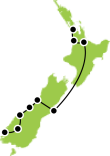

In a previous post we discussed the reasons behind the extreme measures New Zealand Customs and Biosecurity New Zealand take to stop you Bringing Food into New Zealand and the possible consequences for both you and the country. Today we are looking at your personal medication and how to bring it through New Zealand Customs with the least amount of hassle.
Personal Medication
If you are bringing any form of medication into New Zealand, make sure it is in its original packaging and that you have a copy of the prescription. If the medication contains narcotics like diuretics, depressants, stimulants, heart drugs, tranquillisers, and sleeping pills - then you must have a doctor’s certificate stating the medication is necessary and being used under doctor’s instructions. This medication must be declared on arrival at New Zealand Customs.
- Declare the medicine on your Passenger Arrival Card.
- Have a copy of the medicine’s prescription or a letter from your doctor stating that you are being treated with the medicine.
- Have the medicine in its original pharmacy container, with your name on the label, and strength and dosage details clearly stated.
- Have no more than three months supply (oral contraceptives, where a six month supply is permitted, are the exception).
Pseudoephedrine
Found in Common Cold and Flu remedies, Pseudoephedrine has been reclassified from a class C to B2 controlled drug under the Misuse of Drugs Amendment Act in New Zealand. Pseudoephedrine is the primary ingredient for a drug commonly known as ‘P’ but other names include Meth, Speed, Pure, Crystal, Ice, Crystal Meth, Crank and Glass.
Common Brand Names: Sudafed is a trademark for a common brand that contains pseudoephedrine,although Sudafed PE does not contain it. The following are some brand names of medications that have previously contained Pseudoephedrine, though some of them by now may contain phenylephrine instead.
- Sudafed (Johnson & Johnson [formerly Pfizer]
- Actifed (Burroughs Wellcome)
- Contac (GlaxoSmithKline) - contains pseudoephedrine HCL.
- Claritin-D - contains Loratadine along with pseudoephedrine.
- Zyrtec-D 12 Hour - contains pseudoephedrine HCL as well as cetirizine.
- MucinexD - contains pseudoephedrine and guaifenesin, an expectorant.
- Eltor (Sanofi Aventis)
- Allegra D (Sanofi Aventis) - contains fexofenadine and pseudoephedrine.
In short don't bother bringing it into the country as it will be confiscated and you could be fined or if you have more than reasonably required for personal use you could be deported or even jailed.
Medical Cannabis or Marijuana Based Products
Especially for medical use supplied in the United States
Cannabis-based products supplied in the United States of America (or any other country) cannot be carried with you when entering or leaving New Zealand.
A number of US states permit the medical use of cannabis-based products. However, under Federal law cannabis-based products for medical use are not considered lawfully supplied, unless the product has US Food and Drug Administration approval.
To date, no drug product containing or derived from botanical cannabis (the cannabis plant) has been approved by the Food and Drug Administration.
Article: Man deported after arriving in NZ with medicinal cannabis
Illicit drugs – offences and penalties - Just so you know
There is a wide range of controlled and illegal drugs, which the Misuse of Drugs Act 1975 classifies according to the level of risk of harm they pose to people misusing them:
- Class A (very high risk): methamphetamine, magic mushrooms, cocaine, heroin, LSD (Acid)
- Class B (high risk): cannabis oil, hashish, morphine, opium, ecstasy and many amphetamine-type substances
- Class C (moderate risk): cannabis seed, cannabis plant, codeine.
Visit the New Zealand Legislation website for a full version of the Misuse of Drugs Act 1975 and later amendments (link is external).
Penalties
In the following list, 'indictment' refers to a conviction dealt with in a Crown Court (with a jury); 'summarily' refers to a conviction in a Magistrates Court.
Possession
- Class A 6 months imprisonment and/or $1,000 fine
- Class B 3 months imprisonment and/or $500 fine
- Class C 3 months imprisonment and/or $500 fine
Supply or manufacture
- Class A Life imprisonment
- Class B 14 years imprisonment
- Class C Indictment – 8 years imprisonment. Summarily – 1 year jail and/or $1,000 fine
Top Tips for the Smart Traveler.
- Keep all medications and vitamins in their original packaging (plastic bottles are now available in most cases).
- Carry all Medications in your hand luggage – let your airline carrier know in advance if you will be carrying syringes – Just in case your luggage is lost.
- Have a copy of the medicine’s prescription or a letter from your doctor stating that you are being treated with the medicine - keep these separate to the actual drugs, in case you lose your bag in your travels.
- Declare the medicine on your Passenger Arrival Card - Passenger Arrival Cards are usually given to you to complete by your crew on your way to New Zealand. The cards tell you what we consider are 'risk goods'.
Note: The Passenger Arrival Card is a legal document. If you make a false or incorrect declaration – even by accident – you are breaking the law and you can be fined or put in prison.
- If you are buying any medication overseas, check the dosage — it may be more or less than the amount you normally take.
- If you are unable to carry enough medication for your entire trip, make sure you take a letter from your doctor detailing the medication, dosage and what it is for, especially if it is a painkiller or another drug a doctor may be wary of prescribing.
IF YOU ARE NOT SURE: Certain classes of prescription medicines are regarded as illegal substances in some countries and the consequences of carrying them can be dire. If you are not sure please contact the Advisor (Controlled Drugs), Medicines Control on 00 61 4 816 2018 or by email to: [email protected]
For further advice or assistance planning your Hassle-free New Zealand holiday of a lifetime and to receive a free, no obligation, personalised itinerary - just follow the link and answer a few brief questions
More articles to help you plan your trip to New Zealand
Getting to New Zealand
New Zealand Passport and Visa Requirements
Smooth as possible on arrival to New Zealand
Travel Insurance for New Zealand
Doubtful Sound or Milford Sound?
What is the Best Time to Visit New Zealand?
Driving in New Zealand
Safety in New Zealand's Great Outdoors
What to Pack for a New Zealand Holiday
New Zealand Accommodation Guide
New Zealand's Need to Know Facts
What do things cost in New Zealand
Last updated on the 28th of January 2019 by Brent
Recent Posts
Blog Categories
Blog archives
- April 2025 (2)
- February 2025 (3)
- January 2025 (6)
- December 2024 (12)
- November 2024 (3)
- October 2024 (2)
- July 2024 (2)
- May 2024 (12)
- April 2024 (2)
- March 2024 (2)
- January 2024 (2)
- November 2023 (10)
- October 2023 (4)
- August 2023 (1)
- May 2023 (2)
- April 2023 (2)
- March 2023 (17)
- February 2023 (4)
- January 2023 (4)
- December 2022 (11)
- November 2022 (7)
- October 2022 (1)
- May 2022 (1)
- March 2022 (3)
- February 2022 (3)
- January 2022 (1)
- December 2021 (1)
- August 2021 (1)
- June 2021 (1)
- May 2021 (2)
- February 2021 (1)
- August 2020 (1)
- July 2020 (1)
- May 2020 (1)
- April 2020 (1)
- March 2020 (1)
- January 2020 (1)
- December 2019 (1)
- November 2019 (1)
- October 2019 (1)
- September 2019 (1)
- August 2019 (5)
- July 2019 (2)
- June 2019 (1)
- May 2019 (3)
- April 2019 (1)
- March 2019 (1)
- February 2019 (1)
- January 2019 (1)
- December 2018 (1)
- November 2018 (1)
- September 2018 (1)
- August 2018 (1)
- July 2018 (1)
- June 2018 (1)
- May 2018 (1)
- April 2018 (1)
- March 2018 (1)
- February 2018 (1)
- January 2018 (1)
- December 2017 (1)
- October 2017 (1)
- September 2017 (1)
- August 2017 (1)
- July 2017 (1)
- June 2017 (1)
- May 2017 (1)
- April 2017 (1)
- March 2017 (1)
- February 2017 (1)
- January 2017 (1)
- December 2016 (1)
- November 2016 (1)
- October 2016 (1)
- September 2016 (1)
- August 2016 (1)
- July 2016 (1)
- June 2016 (1)
- May 2016 (1)
- April 2016 (1)
- March 2016 (1)
- February 2016 (1)
- January 2016 (1)
- December 2015 (1)
- November 2015 (1)
- October 2015 (1)
- September 2015 (1)
- August 2015 (1)
- July 2015 (1)
- June 2015 (1)
- May 2015 (1)
- April 2015 (1)
- March 2015 (1)
- February 2015 (1)
- January 2015 (1)
- December 2014 (1)
- November 2014 (1)
- October 2014 (1)
- September 2014 (1)
- July 2014 (1)
- June 2014 (3)
- May 2014 (1)
- April 2014 (1)
- March 2014 (1)
- February 2014 (1)
- January 2014 (1)
- November 2013 (15)
- October 2013 (1)
- September 2013 (1)
- August 2013 (1)
- July 2013 (1)
- May 2013 (1)
- April 2013 (1)
- March 2013 (1)
- February 2013 (1)
- January 2013 (1)
- December 2012 (1)
- November 2012 (2)
- October 2012 (2)
- September 2012 (2)
- August 2012 (2)
- July 2012 (2)
- June 2012 (2)
- May 2012 (2)
- April 2012 (3)
- March 2012 (2)
- February 2012 (2)
- January 2012 (2)
- December 2011 (2)
- November 2011 (1)
- October 2011 (2)
- September 2011 (1)
- August 2011 (1)
- July 2011 (1)
- June 2011 (1)
- May 2011 (1)
- April 2011 (1)
- March 2011 (1)
- February 2011 (1)
- January 2011 (1)
- December 2010 (1)
- November 2010 (1)
- October 2010 (1)
- September 2010 (1)
- August 2010 (1)
- July 2010 (1)
- June 2010 (1)
- May 2010 (1)
- March 2010 (1)
- February 2010 (1)
- January 2010 (1)
- December 2009 (1)
- November 2009 (1)
- October 2009 (1)
- September 2009 (1)
- August 2009 (1)
- July 2009 (1)
- June 2009 (1)
- May 2009 (1)
- April 2009 (1)
- March 2009 (1)
- February 2009 (1)
- January 2009 (1)
- December 2008 (1)
- May 2005 (1)










